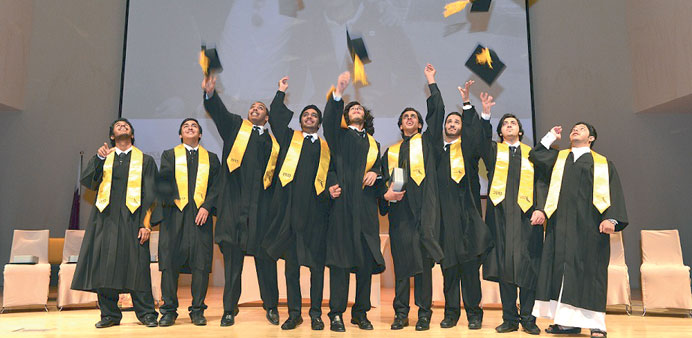Ten graduates recently received their diplomas from Awsaj Academy as the institution marked its eighth graduation ceremony.
The event, held at the Awsaj Academy auditorium, was attended by parents, students, staff and several distinguished guests, including Hassad Food chief executive officer and Awsaj Academy Board of Governors chair Fahad al-Subaiey, Oryx GTL chief executive officer Abdulrahman M al-Suwaidi, Qatar Foundation’s Pre-University Education executive director Buthaina A al-Nuaimi, Awsaj Academy Board member Dr Ibrahim A Janahi, and College of The North Atlantic Qatar (CAN-Q) president Dr Ken McLeod.
The pre-ceremony featured a musical piece performed by Marasi, a band from Qatar Music Academy.
In his welcome address, Awsaj Academy director Dr Ralph Pruitt paid tribute to the graduates by saying: “Today you are leaving with a diploma that is recognised by colleges around the world. You have been successful due to your perseverance and desire to achieve in order to meet an important goal.”
Al-Subaiey, who was the keynote speaker, talked about the important role values and religion play in everyone’s lives.
During this year’s graduation Al-Suwaidy recognised one of Awsaj Academy’s graduates Ghanim al-Solaiti for his outstanding achievements.
Al-Solaiti was awarded a scholarship from Oryx GTL covering the cost of up to four years of university or college tuition.
Awsaj Academy High School principal Dr Don Francis encouraged the graduates to be responsible citizens.
Diplomas and gifts were awarded by Al-Subaiey, Dr Pruitt and Dr Francis to Jassim AbdulRahman al-Thani, Aisha Abdulla al-Thani, AbdulHameed Tareq al-Emadi, AbdulRahman Hassan al-Derham, Abdulla Faisal Bahzad, Ghanim Ali al-Solaitti, Fahad Hassan al-Naimi, Faisal Abdulla al-Dafaa, Mohamed Hamad al-Thani and Nayef Fahad al-Thani.
This year’s graduates plan to continue their studies at colleges and universities in Qatar, the UK, Canada and the US.
Awsaj Academy is a member of Qatar Foundation for Education, Science and Community Development, that serves students with learning challenges in grades K-12.
Students are served in small classrooms with no more than ten students while teachers use evidence-based instructional practices to meet the individual needs of students with additional support provided as needed.

Awsaj Academy students celebrate their graduation.
